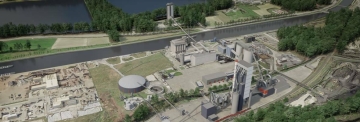Holcim starts the permitting procedure for a new sustainable cement plant in Mons

GO4ZERO's ambition is not only to make existing capacities more sustainable, but also to provide a concrete solution in the fight against global warming. Holcim Belgium wishes to invest in new infrastructure. By using the best available technologies, operational, economic and sustainable performance can be obtained.
GO4ZERO's ambition is not only to make existing capacities more sustainable, but also to provide a concrete solution in the fight against global warming. Holcim Belgium wishes to invest in new infrastructure. By using the best available technologies, operational, economic and sustainable performance can be obtained.
Holcim Belgium announced its GO4ZERO project through the prior information meeting (VIV), the first phase of the permit application procedure. GO4ZERO's ambition is not only to make existing capacities more sustainable, but also to provide a concrete solution in the fight against global warming. Holcim Belgium wishes to invest in new infrastructure. By using the best available technologies, operational, economic and sustainable performance can be obtained.
Today, chalk is processed using the so-called "wet process" in the 2 kilns in Obourg. The existing quarry is approaching the end of its service life. The planned new kiln will have a capacity of 6,000 tons per day, roughly equivalent to the combined capacity of the current 2 kilns. This new kiln will use limestone, rich in calcium carbonate but less moist than chalk, with a so-called "dry" process. With this change of raw material and technology, specific CO2 emissions will be able to be reduced by almost 30%. The limestone will be brought by rail from quarrying sites in Tournai. Holcim and Infrabel are working together for the necessary works on the railroad connections, but also on the connection between the public network and the private stations to be built.
The kiln is a major innovation and was designed to be able to use oxygen as an oxidizer instead of air in the medium term. This allows the CO2 content in the process and fuel gases to be significantly concentrated and then purified, liquefied and treated. In this way, a CO2 neutral process can be obtained in the future.
The Holcim Group has made a clear and firm commitment to reduce its carbon impact. In Belgium, the ambition is to move as quickly as possible to zero CO2 emissions, in function of the economic context and the mechanisms applied by the European Commission, through solutions for the valorization and isolation of CO2. The permitting procedure covers only the first phase of our "zero carbon" ambition. The new state-of-the-art installations will drastically reduce the ecological footprint and will be able to capture 100% of CO2 emissions in the future.
The investment during this first phase amounts to several hundred million euros and the commissioning of the new installations is planned for mid-2025. We expect to complete the permitting procedure by mid-2022. This project will be a major dynamic and economic boost for the region during the entire construction phase and allow the creation of a future sustainable Hub for the processing and valorization of CO2. The support of the government in this type of project is crucial. The project will be submitted for approval to the Holcim Group Board of Directors later this year.
Latest insights & stories

A Global Movement: The World Unites in a Pink Pledge for Clean and Sustainable Water
5,000 participants. 32 countries. €30,000 funds raised. And that's just the beginning.
Picture this: One step that sends ripples across the globe, transforming lives and creating waves of change. You might wonder, how can such a simple action for most of us have such a profound impact?

Sustainability and circularity in construction
Join us in transforming the future of construction, creating buildings that not only stand the test of time but also contribute to a healthier planet!

RainTunes: Shower scenarios for the soul
Light, hearing, smell, and touch: Together with experts, we have developed sensuous scenarios that turn showering into an individual experience. Whether you want to prepare for the day ahead or relax after working out. Whether you want to refresh after a day’s work or unwind at the end of the evening: RainTunes surprises with multisensory experiences.*
*Currently available only in Germany and Austria.